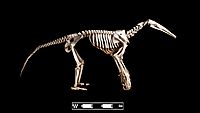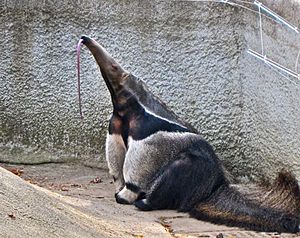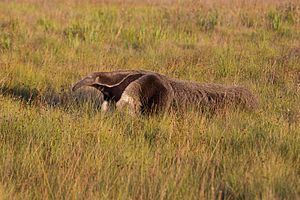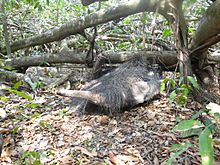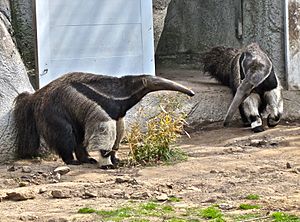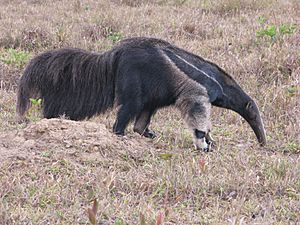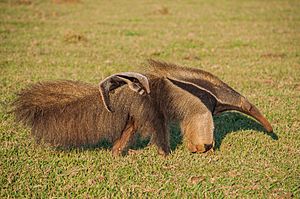Giant anteater facts for kids
Quick facts for kids Giant anteater |
|
|---|---|
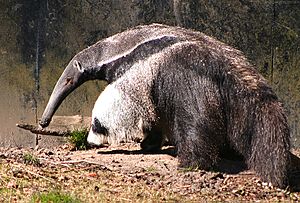 |
|
| A specimen at Copenhagen Zoo, Denmark, 2005 | |
| Conservation status | |
| Scientific classification |
|
| Unrecognized taxon (fix): | Myrmecophaga |
| Species: |
Template:Taxonomy/MyrmecophagaM. tridactyla
|
| Binomial name | |
| Template:Taxonomy/MyrmecophagaMyrmecophaga tridactyla Linnaeus, 1758
|
|
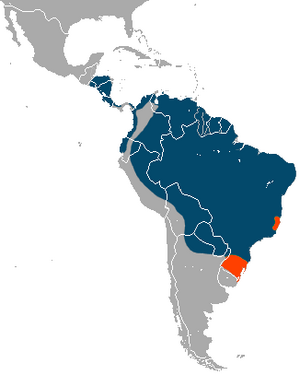 |
|
| Range
extant possibly extinct |
|
| Script error: The function "autoWithCaption" does not exist. | |
| Synonyms | |
|
|
Script error: No such module "Check for conflicting parameters".
The giant anteater (scientific name: Myrmecophaga tridactyla) is a unique animal found in Central and South America. It's sometimes called the ant bear. This amazing creature is the only mammal that doesn't have teeth! It mostly eats termites and ants, which is how it got its name.
The giant anteater is the biggest type of anteater. It can grow to be about 182 to 217 centimeters (6 to 7 feet) long. Males usually weigh between 33 and 41 kilograms (73-90 pounds). Females are a bit lighter, weighing 27 to 39 kilograms (60-86 pounds). Unlike some other anteaters and sloths that live in trees, the giant anteater lives on the ground. It likes to find food in open areas but rests in forested habitats where it can find shade.
Contents
What Makes Giant Anteaters Special?
You can easily spot a giant anteater by its large size and long, narrow snout. It also has a very long, bushy tail. Its body can be up to 217 cm (7 ft 1+1⁄2 in) long. Males are generally bigger and stronger than females.
The anteater's head is about 30 cm (12 in) long, with a snout that looks like a cylinder. Its eyes, ears, and mouth are quite small. Giant anteaters don't see very well, but they have an amazing sense of smell. Their sense of smell is about 40 times better than a human's!
Their fur is usually grey, brown, or black with white patches. They have white front legs with black rings around their wrists and hands. Their back legs are dark. A thick black stripe with white edges runs from their throat to their shoulders. Their tail is brown. The fur on their tail is very long, making it look even bigger. They also have a mane of fur that stands up along their back. Scientists once thought their bold pattern helped them hide, but now they think it might be a warning sign to predators.
Giant anteaters have five toes on each foot. Three toes on their front feet have very large claws, especially the middle one. They walk on their front knuckles, similar to gorillas. This helps them walk without dulling their sharp claws. Their back feet have short claws on all five toes and walk flat on the ground. These animals are excellent diggers, using their strong front limbs and claws to break open insect nests.
Giant anteaters have a slightly lower body temperature than most mammals, around 33 °C (91 °F). This is because they have a slower metabolism compared to other mammals. This slower metabolism is linked to their special diet and how they move.
How Giant Anteaters Eat
Giant anteaters have no teeth and can barely move their jaws. Instead, they use their long, sticky tongue to catch food. Their tongue is about 60 cm (24 in) long and is very moist because of large salivary glands.
Because their mouth is so small, their tongue can only move forward and backward. When they eat, they aim their head to guide their tongue. When fully stretched out, their tongue can reach 45 cm (18 in)! It can flick in and out about 160 times per minute, which is almost three times every second. A special muscle connects their tongue directly to their chest bone, helping it move so fast.
To swallow, the anteater rubs its tongue against the roof of its mouth to crush the insects. They swallow almost constantly while eating. Their stomach is like a bird's gizzard, with tough folds that help grind up food. They also swallow some sand and soil to help with this process. Giant anteaters don't make their own stomach acid. Instead, they use the formic acid found in the ants and termites they eat to digest their meal.
Where Giant Anteaters Live and Their Status
Giant anteaters live in Central and South America. You can find them from Honduras all the way down to Bolivia and northern Argentina. However, they are no longer found in Uruguay, Belize, El Salvador, and Guatemala. They are also missing from parts of Costa Rica, Brazil, Argentina, and Paraguay. They can live in different places, from tropical rainforests to dry shrublands, as long as there's enough food.
The International Union for Conservation of Nature (IUCN) lists the giant anteater as a vulnerable animal. This means their numbers are decreasing. Their population has dropped by more than 30 percent in the last three generations. They are also protected by CITES (Convention on International Trade in Endangered Species), which limits international trade of these animals.
Wildfires are a big threat to giant anteaters. In 1994, about 340 anteaters died in fires at Emas National Park in Brazil. Their fur can easily catch fire, and they are too slow to escape.
Other dangers come from humans. Anteaters can be hit by cars, attacked by dogs, and lose their homes due to habitat destruction. Roads can break up their living areas, making it harder for them to find food and mates.
In Bolivia, people sometimes hunt giant anteaters for sport or for food. Their tough skin is used to make equipment for horse-riding. In Venezuela, they are sometimes killed for their claws. Some people also kill them if they feel threatened by them. Luckily, giant anteaters live in many different places and can adapt well. Large protected areas like the Amazon, Pantanal, and cerrado offer safe places for them. In Argentina, some local governments protect them as a national heritage species.
Giant Anteater Behavior and Life
Even though they are well-known, scientists haven't studied giant anteaters much in the wild. They can use different types of habitats. A study in Brazil found that anteaters move and find food in open areas. They rest in forests, which give them shade when it's hot and keep them warm when it's cool. Giant anteaters can travel about 3,700 m (12,100 ft) (over 2 miles) each day.
Giant anteaters can be active during the day (diurnal) or at night (nocturnal). In warm weather, they are often more active at night. But when it gets cooler, they might be more active during the day. Sometimes, being active at night is a way for them to avoid humans.
When they sleep, giant anteaters prefer dense bushes. If it's cooler, they might use tall grass. They dig a shallow hole in the ground to rest. They sleep curled up with their bushy tail covering their body. This helps keep them warm and also hides them from predators. Sometimes, they might sleep flat on their side to soak up the sun's warmth. Giant anteaters also enjoy bathing and can even swim across wide rivers. They can climb too, and have been seen climbing termite mounds and trees to find food.
How Giant Anteaters Live Together
The size of a giant anteater's home ranges (the area where they live) can vary a lot. It can be as small as 2.7 km2 (667 acres) or as large as 32.5 km2 (8,031 acres). Most giant anteaters live alone, except for mothers with their young. They communicate by leaving scents from their anal glands and by marking trees. They seem to be able to recognize each other by smell.
Female anteaters are more tolerant of each other than males. Males are more likely to fight. Fights usually start with them circling each other and making a "harrr" sound. This can turn into chasing and wrestling, where they use their claws. Fighting anteaters might also roar or bellow. Males might be territorial, meaning they protect their living area.
What Giant Anteaters Eat
Giant anteaters are insectivores, which means they mostly eat ants and termites. In areas that flood often, like the Pantanal, they eat more ants because termites are harder to find. But in grasslands, where termites are common, they eat mostly termites. In some places, they might switch between eating ants and termites depending on the season.
Anteaters find their prey by scent. Once they find a nest, they tear it open with their strong claws. Then, they stick their long, sticky tongue inside to collect the insects. This includes eggs, larvae, and adult insects. An anteater can visit up to 200 nests in one day, spending about a minute at each. In total, they can eat around 35,000 insects daily! Soldier ants or termites might try to drive the anteater away by biting or using chemicals. Termites might also hide in their strong mounds or use underground tunnels to escape.
Sometimes, anteaters also eat beetle larvae and even western honey bees. They might target termite mounds that have beehives. Anteaters in zoos are fed a mix of milk, eggs, mealworms, and ground beef. To drink, they might dig for water if there's none on the surface. These waterholes can then be used by other animals too.
Reproduction and Life Cycle
Giant anteaters can mate all year round. A male will follow a female who is ready to mate. Sometimes, a mating pair will even share the same insect nest while eating. When they mate, the female lies on her side, and the male hunches over her. A pair might stay together for up to three days and mate several times.
After about 170 to 190 days, the female gives birth to a single baby. There's a chance they might have a "delayed implantation," meaning the baby's development pauses for a bit. Females give birth while standing up.
Newborn pups weigh about 1–2 kg (2.2–4.4 lb) (2-4 pounds) and their eyes are closed for the first six days. The mother carries her baby on her back. The baby's black and white stripes line up with its mother's, helping it blend in and stay hidden. The mother grooms and nurses her young. The baby communicates with its mother using sharp whistles. After three months, the mother grooms less, and the young starts to eat solid food. The baby leaves its mother when it's about 10 months old. Giant anteaters become ready to have their own babies when they are 2.5 to 4 years old.
How Long Giant Anteaters Live
Giant anteaters can live for about 15 years in the wild. But in zoos, they can live twice as long! jaguars and pumas are their main predators. When in danger, anteaters usually run away by galloping. But if they are trapped, they will stand up on their back legs and attack with their powerful front claws. These claws are so strong they can even kill a jaguar.
Giant Anteaters and Humans
Giant anteaters are usually not a threat to humans. However, their front claws can cause very serious injuries. Between 2010 and 2012, two hunters in Brazil were killed by giant anteaters. In both cases, the anteaters seemed to be acting in self-defense.
Related pages
Images for kids
-
Anteater mask and scratcher used by Kayapo boys in their ceremonies
See also
 In Spanish: Oso hormiguero gigante para niños
In Spanish: Oso hormiguero gigante para niños
 | Aaron Henry |
 | T. R. M. Howard |
 | Jesse Jackson |




